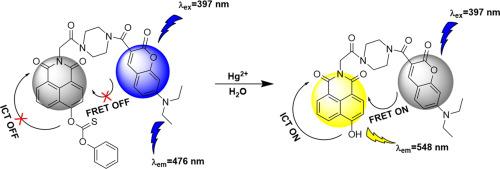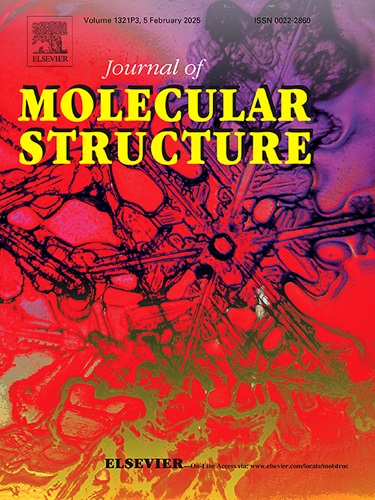A coumarin-naphthalimide-based fluorescent probe for the ratiometric detection of Hg2+ utilizing an ICT-FRET mechanism
IF 4
2区 化学
Q2 CHEMISTRY, PHYSICAL
引用次数: 0
Abstract
Mercury, as one of the most toxic elements in environmental and biological samples, can poses a grave threat to the integrity of the nervous, reproductive, immune, and digestive systems. Hence, it is significant to exploit convenient and rapid fluorescent probes featuring high sensitivity and selectivity for monitoring the concentration level of mercury ions (Hg2+). In this paper, a ratiometric fluorescent probe for Hg2+ based on intramolecular charge transfer (ICT) and fluorescence resonance energy transfer (FRET) mechanisms was developed by using coumarin ad energy donor and naphthalimide as energy acceptor, and thionocarbonate as the recognizing group for Hg2+. When the probe alone was present in the system, the thionocarbonate group of the probe prevented the electron transfer and the ICT process was off, thus preventing the FRET process of the probe as well. The probe alone emitted the intrinsic blue fluorescence of coumarin upon excitation at 397 nm. After providing Hg2 the thionocarbonate unit reacted with Hg2+, which restored the ICT process of the naphthalimide donor, and the FRET process in turn took place. Upon adding Hg2+, the probe emitted yellow fluorescence. In addition, the fluorescence intensity ratio at 548 nm and 476 nm (I548 nm/I476 nm) of the probe linearly corrected with the concentration of Hg²⁺ ions in the range of 0.1–12 μM. A limit of detection of 0.055 μM was obtained. Meanwhile, the probe exceptional recognized Hg2+ across a broad pH range (pH=4.00–10.00), including physiological pH. Cellular studies further confirmed the probe's negligible cytotoxicity and its potential for ratiometric fluorescence imaging of intracellular Hg²⁺ ions in A549 cells. In addition, the probe was loaded on filter paper to make test strips and combined with a smartphone to achieve rapid visual quantitative detection of Hg2+.

一种基于香豆素-萘酰亚胺的荧光探针,用于利用ICT-FRET机制比例检测Hg2+
汞作为环境和生物样品中毒性最大的元素之一,可对神经、生殖、免疫和消化系统的完整性构成严重威胁。因此,开发方便、快速、高灵敏度、高选择性的荧光探针监测汞离子(Hg2+)浓度水平具有重要意义。本文以香豆素为能量供体,萘酰亚胺为能量受体,硫代碳化物为Hg2+的识别基团,开发了一种基于分子内电荷转移(ICT)和荧光共振能量转移(FRET)机制的Hg2+比例荧光探针。当探针单独存在于系统中时,探针的硫代碳酸盐基团阻止了电子转移,关闭了ICT过程,从而也阻止了探针的FRET过程。探针在397nm激发下单独发出香豆素固有的蓝色荧光。在提供Hg2后,硫代碳酸酯单元与Hg2+反应,恢复了萘酰亚胺供体的ICT过程,并反过来发生了FRET过程。加入Hg2+后,探针发出黄色荧光。此外,探针在548 nm和476 nm处的荧光强度比(I548 nm/I476 nm)随Hg 2 +离子浓度在0.1 ~ 12 μM范围内线性校正。检测限为0.055 μM。同时,该探针在广泛的pH范围内(pH= 4.00-10.00)异常识别Hg2+,包括生理pH。细胞研究进一步证实了该探针可忽略不计的细胞毒性,以及它在A549细胞中用于细胞内Hg2+离子比例荧光成像的潜力。此外,将探针装在滤纸上制作试纸条,并与智能手机结合,实现Hg2+的快速视觉定量检测。
本文章由计算机程序翻译,如有差异,请以英文原文为准。
求助全文
约1分钟内获得全文
求助全文
来源期刊

Journal of Molecular Structure
化学-物理化学
CiteScore
7.10
自引率
15.80%
发文量
2384
审稿时长
45 days
期刊介绍:
The Journal of Molecular Structure is dedicated to the publication of full-length articles and review papers, providing important new structural information on all types of chemical species including:
• Stable and unstable molecules in all types of environments (vapour, molecular beam, liquid, solution, liquid crystal, solid state, matrix-isolated, surface-absorbed etc.)
• Chemical intermediates
• Molecules in excited states
• Biological molecules
• Polymers.
The methods used may include any combination of spectroscopic and non-spectroscopic techniques, for example:
• Infrared spectroscopy (mid, far, near)
• Raman spectroscopy and non-linear Raman methods (CARS, etc.)
• Electronic absorption spectroscopy
• Optical rotatory dispersion and circular dichroism
• Fluorescence and phosphorescence techniques
• Electron spectroscopies (PES, XPS), EXAFS, etc.
• Microwave spectroscopy
• Electron diffraction
• NMR and ESR spectroscopies
• Mössbauer spectroscopy
• X-ray crystallography
• Charge Density Analyses
• Computational Studies (supplementing experimental methods)
We encourage publications combining theoretical and experimental approaches. The structural insights gained by the studies should be correlated with the properties, activity and/ or reactivity of the molecule under investigation and the relevance of this molecule and its implications should be discussed.
 求助内容:
求助内容: 应助结果提醒方式:
应助结果提醒方式:


